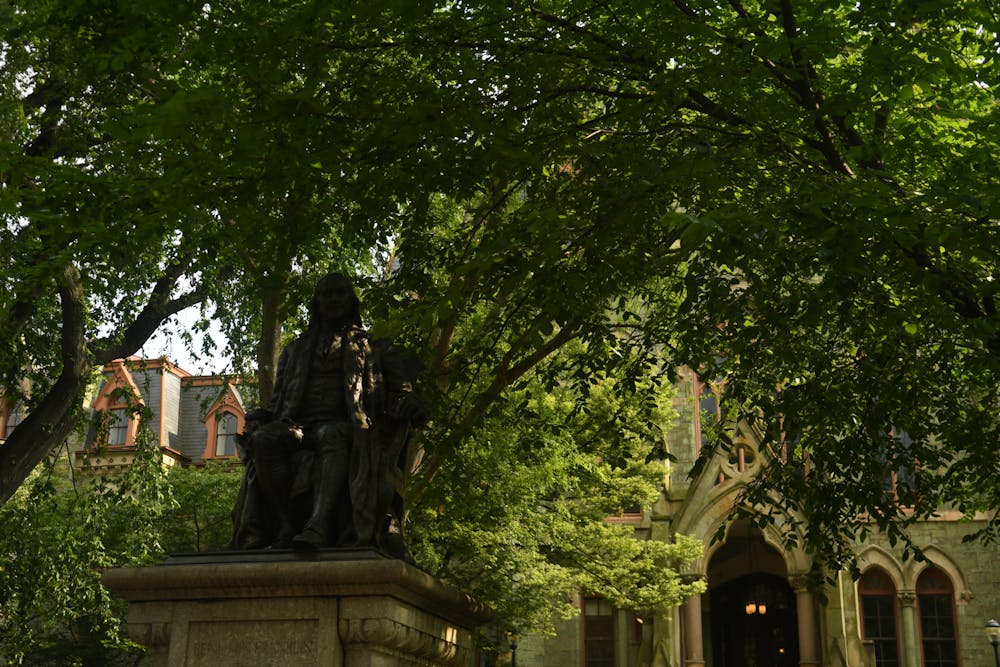
Columnist Francesco Salamone urges us develop a culture of abundance rather than hunger for achievement.
Credit: Mollie BennYou complain about having too much on your plate, but your goal is to eat. You gorge yourself on classes, clubs, and internships but remain perennially hungry for achievement. I cannot help but wonder: what does it take once and for all to feel full? At Penn, we eat without digesting. What if we patiently chewed each bite? What if we allowed ourselves to assimilate? I suspect the answer to our satiety lies precisely in the slow act of reflection. Bear with me.
One semester of phenomenology convinced me that every experience can be delineated by an invisible circle. To plan something does not mean to experience it. Similarly, to do something is not enough to experience it. What ultimately allows us to assimilate experiences is reflection. To reflect means to close the circle. This closure is not only what makes an experience an experience, but what makes an experience yours, part of yourself and who you are. Planning and doing alone are insufficient to truly experience. At Penn, everyone is good at planning, most are good at doing, but virtually no one is good at reflecting. Why?
Achievement and reflection are incompatible. Penn is composed of inexhaustible stimuli. It is great. It means learning is interminable. It is a privilege to have such resources at our fingertips. However, the overabundance of stimuli leads to a burgeoning insuperable achievement bar. You can enroll in one more credit, join one more community, squeeze in one more lunch with someone. The impermanence and fleetingness of such fragmented stimuli accelerate achievement interminably. A culture of achievement thus automatically removes reflection. You cannot drive both slowly and fast.
Reflection, by contrast, requires slowness. Presence rather than prep. In familiar Wharton language, to reflect is to take stock, to take the sum of the credits and debits of the accounting of life. Do I find this class, this community, this club, this work net positive or net negative? Energizing or draining? What did I like and what did I not like? Why? What are my values? Is what I have just done aligned with my values?
You have hundreds of social interactions in a week and remember only a few. You do your economics homework while listening to the statistics lecture. You skip a meal for a club meeting. You schedule back-to-back meetings so there is no time left to ask whether they even matter to you. You ask me what classes I am taking next semester when this one is not remotely over. You live projecting yourself in an illusionary future. You believe you are disburdening yourself of the laborious task of asking difficult questions about values but of course, it is precisely reflection to be disburdening; suppressing it is the real difficulty.
Character is also needed to reflect, but achievement and character are also incompatible. A lack of character enables indiscriminate achievement. The less shape you have, the smoother and slicker you are, the more you can be liked by others, the more clubs and parties you can get into, the more connections you can add on LinkedIn, the more doors they will open for you. Never mind that you may want some of those doors to be closed. To be a characterless achiever means to spend more and more effort wondering where you are going because you are less and less sure of where you are.
I am open to being wrong and to criticism about my hyperbolism. You need to inflate a problem to make it visible. What I am insinuating is that it is not a coincidence that we are hungry for achievement and reflect little. The circle of experience remains open without reflection. This incompleteness generates the lingering and pervasive sense of inadequacy manifesting in the incessant hunger I witness. If our hunger for achievement is a symptom, this incompleteness is the disease. Thankfully, to each disease, it has a cure.
When we reflect every day, it leads us to an outlook of contentment and satiety. Reflection helps you recognize abundance rather than scarcity. As botanist Robin Wall Kimmerer reminds us, “Gratitude and abundance cultivate an ethic of fullness but our economy needs emptiness.”
I will leave the exercise of figuring out how to integrate reflection into your own life to the only person capable and responsible for such a task. If you read my daily journal, you would conclude that my need to reflect is pathological, but you can compensate with whatever format and style of reflection works best for you.
The truth is that we have turned oblivious to our experiences, heedless even. We live in a world that does not reward reflection. Yet there should not be an incentive to reflect because reflection is not a means to an end; it is the end itself. Reflection may very well not be indispensable but perhaps this is precisely what makes it essential. Developing the habit of reflection means developing the capacity to change. I know I will reflect on what I wrote and who knows, perhaps I will change my mind.
FRANCESCO SALAMONE is a Wharton junior studying decision processes from Palermo, Italy. His email address is frasala@wharton.upenn.edu.
The Daily Pennsylvanian is an independent, student-run newspaper. Please consider making a donation to support the coverage that shapes the University. Your generosity ensures a future of strong journalism at Penn.
Donate







